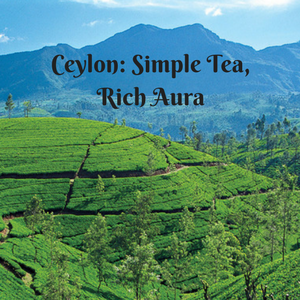
Sri Lanka and The Rise of the Ceylon Tea Empire
We hear empire and think of the past. But Ceylon tea's market still dominates today. Sri Lanka (whose old name was Ceylon) is the world's leading producer of orthodox tea, which is the economic classification of black teas produced in a traditional manner. According to Sri Lanka's official industrial capacity report, 320 million kilograms of teas are produced each year with 100 million kilograms exported. Sri Lanka's arable land mass is vast and highly tea-friendly. To put it simply: there are endless tracts of tea-ready land in Sri Lanka. Each has a uniquely diverse range of climates, meaning a number of varieties of black tea can be easily produced in massive amounts while still remaining intensely fresh and high quality.
How did it all begin?
The Other James Taylor
James Taylor was a man born out of time and place. A Brit, he came to adore and admire the nation then called Ceylon, where developed the nation's agricultural health, their hill country, and his own love for their exquisite teas. So great was his impact (and, fortunately, seemingly free of many of the awful aspects of your average 'great man' of the colonial era) that Sri Lanka celebrates his legacy to this day. Taylor's life also intersected with another United Kingdom tea magnate whose name is slightly better known: one Thomas Lipton, who noticed and visited Ceylon and was so moved by Taylor's impact there that he turned his own business interests to the territory.

Pictured above, James Taylor
A Cup of Ceylon
Ceylon tea is a slightly tart, multi-layered black tea with many varieties but a standard type that is often referred to simply as 'Ceylon'. The name itself is strictly protected, and Ceylon tea that is called so on the package and bears the Sri Lankan national emblem (a distinctly styled lion, found on their flag) must be entirely Sri Lankan produced and quality checked. A parcel of even 95% Sri Lankan tea cannot be called Ceylon or Ceylon Black. Only 100 percent. While Sri Lanka also produces greens, whites and other varieties of tea, they are generally synonymous with their standard 'orthodox' blends.

Ceylon Tea: Clean, High Quality, Plentiful
Sri Lankan teas have modernized, with most plantations overtaken by the government upon the nation's independence, and then released to private hands over the following decades. Ceylon teas are ranked as the cleanest in the world in terms of their low pesticide residues. They are proudly made with an emphasis on both traditional process and modern compliance with the latest standards for quality and healthy. Colombo, Sri Lanka's capital, is also home to the world's largest tea auction.

The landscape of Sri Lanka, hilly, humid, tropical, and leafy, supports very pure and well-oxidized black teas. Freedom from pollution has kept tea plantations clean. Successful entry into modern international sales have allowed producers to not sacrifice quality. And a good reputation for quality has solidified their name in the minds of tea drinks round the world.
There's always a certain degree of luck in which products become associated in the public mind with quality and exotic interest. Sometimes a name is all it takes. Often the actual merit of a thing needs to be combined with a unique aspect to be memorable. Sri Lanka, however, has no gimmick, no special factor. Charmingly enough, they offer us a simply delicious plain black tea. Their secret, if you will, is that they have no secret.
